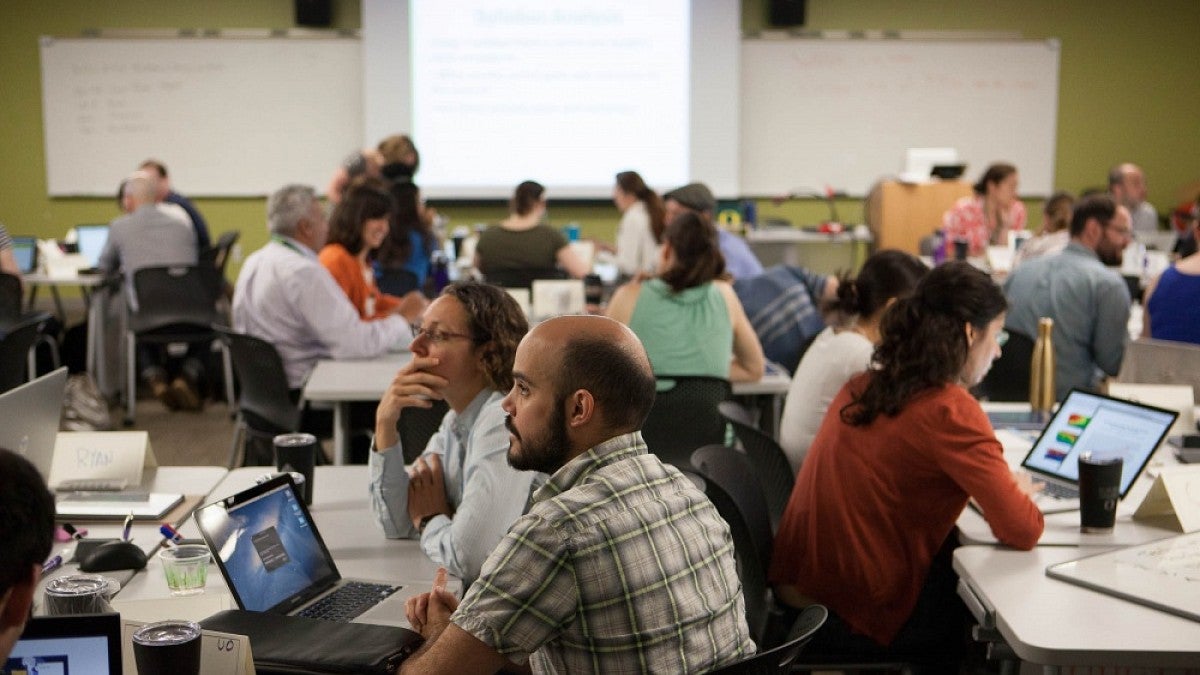When it comes to improving education in science, technology, engineering and math, one challenge UO educators have been wrestling with in recent years has been coordinating curricula among different STEM majors.
“Decisions about degree requirements are made at the departmental level, so the different STEM majors often come to really different solutions to some of the same problems,” said Samantha Hopkins, associate dean of the Clark Honors College and an associate professor in the Department of Earth Sciences. “Because STEM majors generally draw on courses from several different departments, the required courses are sometimes inefficient in achieving the learning objectives for the students, and sometimes the bigger ideas about the process of scientific inquiry can get lost in the need to cover content.”
Thanks to a “mini-grant” from the Association of American Universities’ Undergraduate STEM Education Initiative, Hopkins and other project leaders will be working over the course of the next few years to align curricula across different STEM majors. The UO was one of 12 universities named on Feb. 20 as part of a cohort of AAU member campuses committed to improving undergraduate STEM education.
“This award builds on our existing efforts to effect cultural change around teaching and learning on campus through our Teaching Academy, as well as our support for teaching and structural reforms to improve student outcomes and our reforms to core education and teaching evaluations,” said Jayanth Banavar, provost and senior vice president. “We’re proud to be a part of the AAU effort to improve undergraduate education and we look forward to seeing the dramatic changes that lie ahead for our math and science students.”
Along with Hopkins and Banavar, the project leadership includes Ron Bramhall, associate vice provost and senior instructor in the Lundquist College of Business; Dean Livelybrooks, associate department head, director of graduate studies and senior instructor in the Department of Physics; and Eleanor Vandegrift, associate director of the Science Literacy Program and senior instructor in the Department of Biology.
Sierra Dawson, associate vice president for academic affairs, has been a strong supporter of the UO team and its efforts.
“Since Emily Miller, associate vice president for policy at AAU, visited campus in January 2018, UO has been continually engaged in the AAU’s STEM education initiative,” Dawson said. “We are excited to be working alongside our AAU colleagues to implement evidence-based practices that have been reported to remove barriers to learning for underserved students.”
The UO team will work with a facilitator to share curricular learning objectives for different majors and articulate the similarities and differences among STEM disciplines’ educational objectives. They will host a pair of two-day workshops focusing on laying the groundwork for curricular reform and seek comments from STEM reform experts, UO alumni from STEM disciplines and others with relevant experiences to share.
By aligning major curricula, one hope of the effort is that students will enjoy more mobility between STEM majors. If departments can agree on shared objectives, that could allow development of new courses or sharing of existing courses to better educate STEM students across all majors, Bramhall said.
“If we can find ways to align STEM curricula, we can do a better job helping students achieve common learning objectives,” Bramhall said. “By streamlining curricula and courses we hope to find some new efficiencies, achieve greater collaboration across departments, and lower some of the barriers to entry into STEM fields.”
Bramhall said the real winners will be UO students who will see more streamlined degree requirements and ultimately achieve greater success in STEM courses, as measured by grades, degree progress, retention in STEM majors and mastery of science process skills and competencies.
The UO’s AAU mini-grant proposal builds on the UO’s existing commitment to improving STEM education. In October, Hal Sadofsky, division dean of natural sciences, and David Tyler, chemistry chair, joined the AAU STEM department chairs workshop, Dawson said. Vandegrift attended an AAU meeting for STEM leaders and funding agencies focused on multi-institutional STEM education reform stakeholders. Additionally, there have been numerous efforts by the Office of the Provost, UO Libraries, the Teaching Engagement Program, Undergraduate Engagement and Student Success, the University Senate and others to support improved student learning outcomes in the sciences. The UO’s Science Literacy Program helped develop the framework for the AAU mini-grant proposal through strategic planning during a 2018 Mobile Summer Institute Scientific Teaching, Vandegrift said.
“We’ve sponsored efforts that address all three areas of the AAU’s initiative, including pedagogy, scaffolding and cultural change,” Vandegrift said. “We already have an active and vibrant network of faculty and students engaged in reforming STEM teaching and this award will serve to make our community even stronger.”
The AAU Undergraduate STEM Education Initiative was launched in 2011 to encourage STEM departments at AAU universities to use teaching practices proven to be effective in engaging students in STEM education. The latest group of 12 member campuses is the second cohort to receive grants. Along with the UO, the grants will go to Brandeis University; Case Western Reserve University; Emory University; Georgia Institute of Technology; Indiana University; New York University; Stony Brook University; The University of Arizona; University of Maryland, College Park; University of Toronto; and Washington University in St. Louis.
–By Lewis Taylor, University Communications


